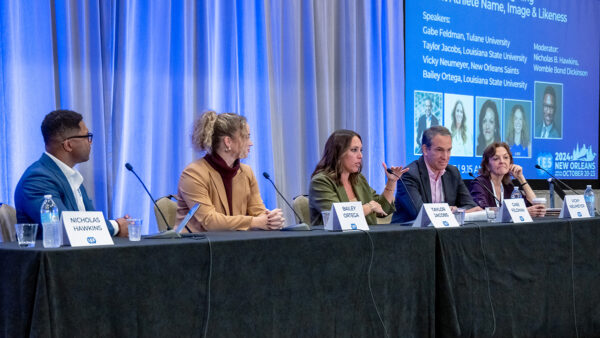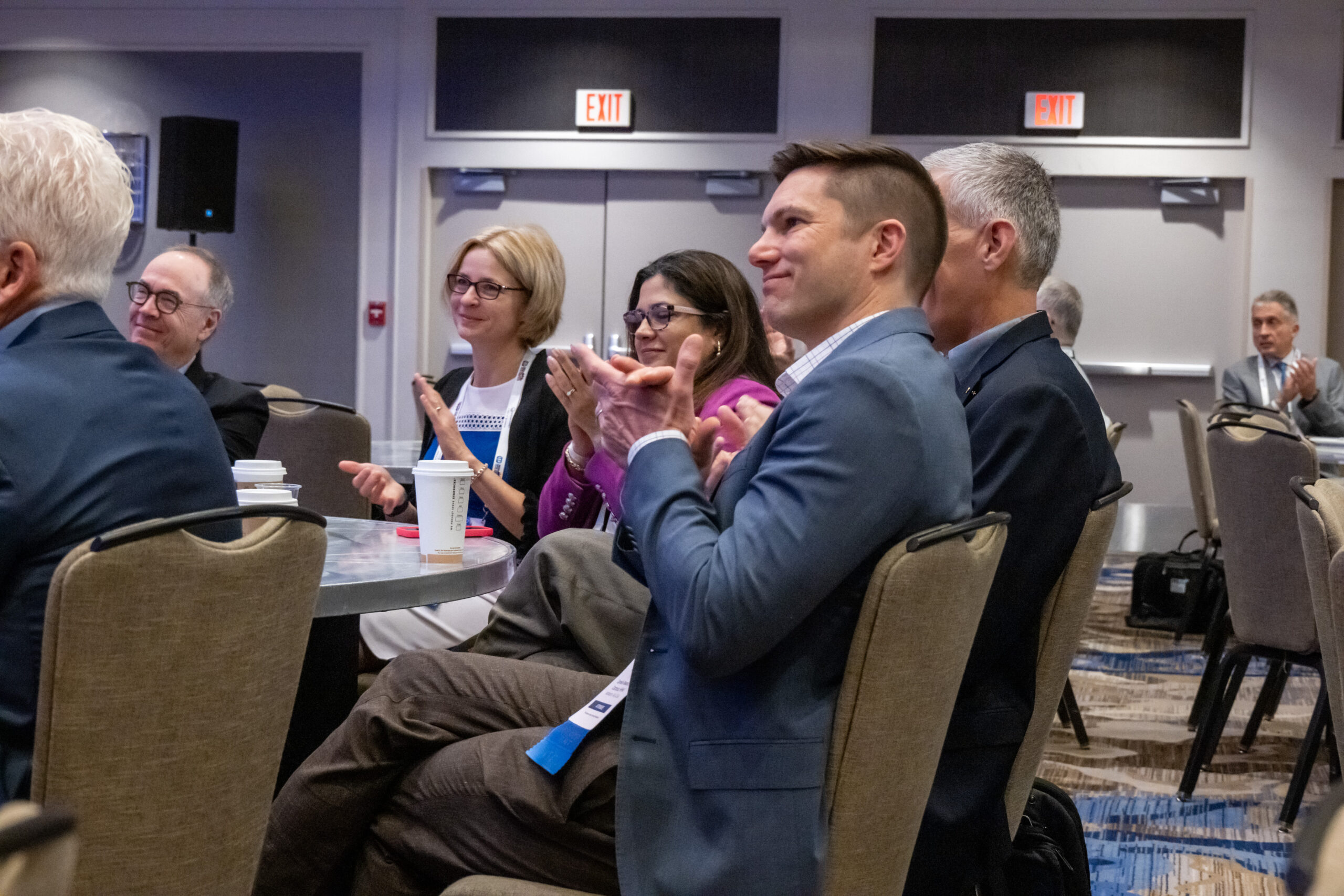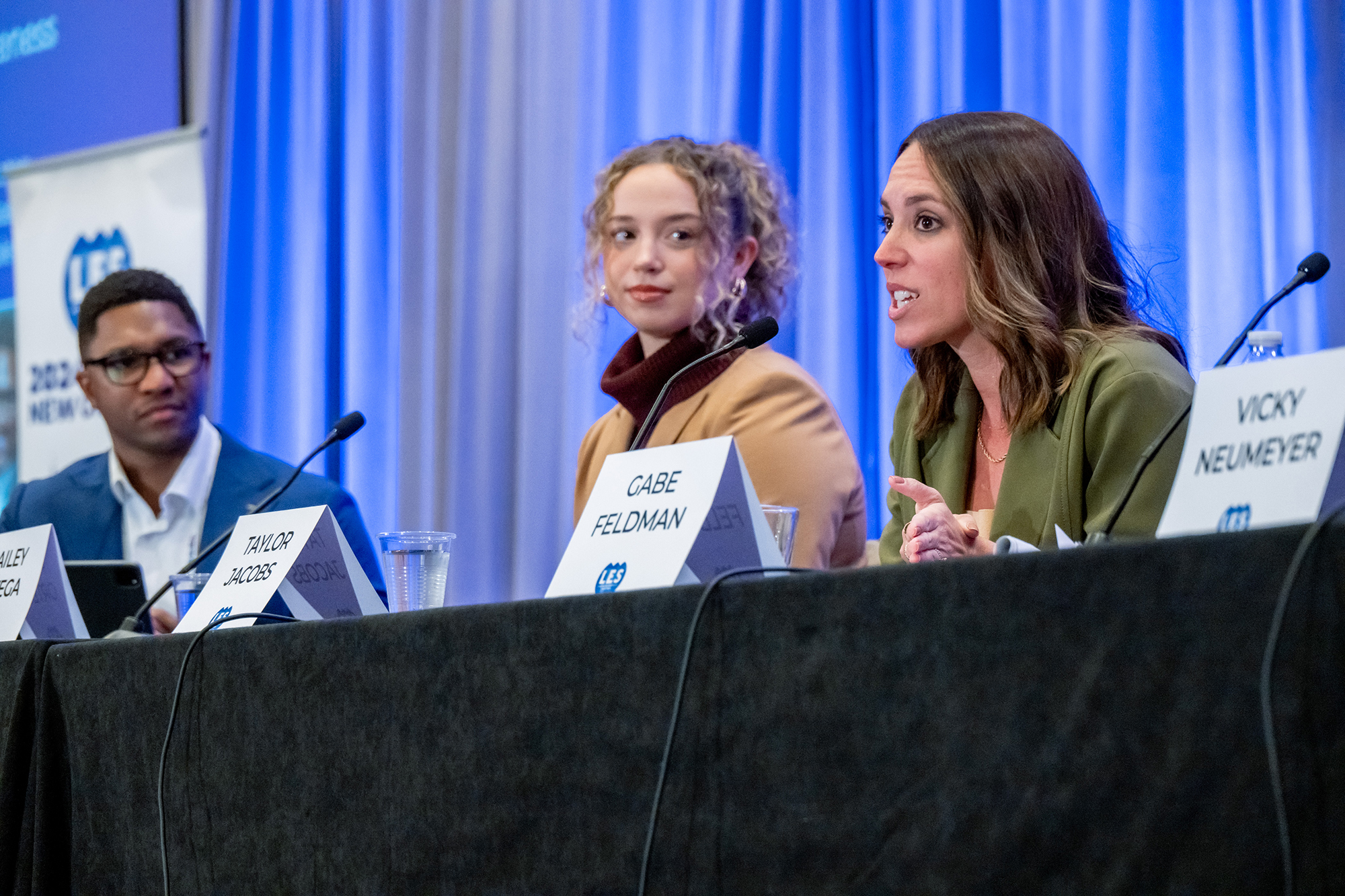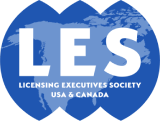
Licensing In Sports Panel: Nicholas Hawkins (left), Bailey Ortega, Taylor Jacobs, Gabe Feldman and Vicky Neumeyer
Viewpoints: Licensing in Sports: Navigating Student-Athlete Name, Image & Likeness
An all-star panel discussed how college athletes can finally benefit financially from use of their name, image, and likeness (NIL) through sponsorships and endorsements. Panelists at the LES Annual Meeting in New Orleans included:
-Nicholas B. Hawkins, Partner, Womble Bond Dickinson LLP, and moderator;
-Bailey Ortega, Student-Athlete, Louisiana State University (LSU),
-Taylor R. Jacobs, Associate Athletic Director of NIL and Strategic Initiatives, Louisiana State University (LSU),
-Gabriel Feldman, Sher Garner Professor of Sports Law and Paul and Abram B. Barron Professor of Law, Tulane University Law School, and
-Vicky Neumeyer, Senior Vice President and General Counsel, New Orleans Saints and New Orleans Pelicans.

LES leaders in the audience: Mike Perham (right), Eric Victory (hidden), Arpi Siyahian, Mihaela Bojin and John Paul.
Conflicts Between School Rights and Athlete Rights
In 2021, the Supreme Court ruled that the NCAA’s restrictions on student-athletes being able to profit from their NIL violated antitrust law, thereby allowing college athletes to sign deals for their name, image, and likeness. However, as Taylor Jacobs highlighted, there is a need to protect both the rights of the schools and the rights of the athletes while providing opportunities for student-athletes. She stated, “I’m teaching them how to capitalize on their rights, but I also have to protect LSU’s rights. Our students don’t fully understand that.” The university strives to be as flexible as possible, by balancing student needs for their own NIL without compromising LSU’s interests.
Bailey Ortega described a recent experience; she had a company doing a deal with her but was also a sponsor of LSU. “I was trying to use the LSU facilities to film a video of me in practice, but I had to turn my LSU shirt inside out. I had to do all of these things to specifically hide my LSU brand because it was conflicting with LSU rights.”
Evolving Role of Collectives in NIL
In the collegiate NIL landscape, “collectives” are independent organizations that pool funds from donors, alumni, and businesses to support NIL deals for student-athletes at a specific university. Efforts are underway to legitimize them as official university partners, raising interesting legal and licensing restrictions.
Taylor Jacobs explains, “The collective at LSU pays the Sports Properties Group to serve as the official collective for LSU athletics. They are promoted at events and have marketing opportunities throughout our facilities. They also have advertisement spaces on the website and more.” They want to be recognized as a legitimate business.
Industry Restrictions and Future Prospects
The next question turned to industries that students are prohibited from making a deal with. “In the State of Louisiana, they’re prohibited from alcohol, tobacco, gambling, and NCAA-banned substances,” said Jacobs. But she points out that the university has dealt with all of those vices and even had a casino partnership at one point. This might lead students to say, “Well, if you can do it, why can’t I?” There are ongoing advocacy efforts to remove these restrictions.

From left, Nicholas Hawkins, moderator; Bailey Ortega and Taylor Jacobs.
From the professional sports perspective, Vicky Neumeyer commented that she was shocked that the NFL allowed gambling. “They have a franchise in Las Vegas!” She went on to explain that the professional players can have an endorsement in the vices, but the NFL teams cannot. The athletes’ agents know what they can and cannot do, so she generally works with them if there’s a problem.
From left, Nicholas Hawkins, moderator; Bailey Ortega and Taylor Jacobs.
Historical Context and Evolution of NIL
Professor Gabe Feldman offered a broader historical context and outlined the legal framework around NIL rights, including how this has shifted over time, particularly with the introduction of state laws allowing college athletes to profit from their name, image and likeness. The question is, “What makes college sports different from pro sports?”
Feldman explains, “The argument is that people watch college sports because they are student-athletes. What makes them student-athletes; one, that they’re students, they go to class, and two, they are not paid based on their athletic ability. Pay based on athletic ability means two things: one, they’re not paid to play, and two, they’re not paid for the value they have generated by their play in their name, image, and likeness. And the fear was that if you started paying them, they didn’t have to go to class; it would just look like professional sports, and people would stop watching.”
There was another cautionary tale about the use of AI to falsify a facial image on social media. Privacy issues arise when players enter an endorsement agreement, their data is released, and privacy protections aren’t in place.
The discussion concluded with reflections on the future of NIL, with hopes for continued growth and the potential for revenue sharing to reduce the reliance on collectives.
# # #
About Licensing Executives Society (USA & Canada), Inc. (LES):
Established in 1965, LES (USA & Canada) is one of the longest running professional societies supporting the development of members engaged in the creation, commercial development, and orderly transfer of intellectual property. LES members include business executives, lawyers, accountants, consultants, and scientists and engineers; who represent innovation-oriented enterprises of all sizes, professional services firms, universities, and government labs. LES is the largest of 43 global member societies of the Licensing Executives Society International, Inc. (LESI). For more information about LES, visit www.lesusacanada.org.
Media Contact:
communications@les.org

Get Social